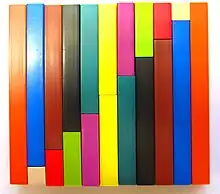Georges Cuisenaire | |
|---|---|
| Born | September 7, 1891 |
| Died | December 31, 1975 |
| Nationality | Belgian |
| Education | Royal Conservatory of Mons |
| Occupation | teacher |
| Known for | Cuisenaire rods |

Georges Cuisenaire (1891–1975), also known as Emile-Georges Cuisenaire,[1] was a Belgian teacher who invented Cuisenaire rods, a mathematics teaching aid.
Life
Cuisenaire graduated from the Royal Conservatory of Music at Mons, where he was awarded first prize for violin. He was a primary school teacher at the Ville-Haute school in Thuin from 26 April 1912. In 1948 he became the founder and principal of the Industrial School of Thuin.
Cuisenaire rods
In 1945, following many years of research and experimentation, Cuisenaire created a game consisting of coloured cardboard strips of various lengths that he used to teach mathematics to young children. In 1951 the first edition of Numbers and Colours, the booklet explaining the method, appeared in Belgium.
The "Cuisenaire Rod" method revolutionised the teaching of mathematics by being recognised by pedagogues and psychologists the world over as an instrument of exceptional efficacity. His method was adopted by thousands of teachers in over sixty countries.
Honours
Cuisenaire was made an officer of the Order of Leopold 11 January 1968. In 1973 UNESCO recommended the use of Cuisenaire learning aids and suggested the reform of mathematics education programmes based on his method.
References
- ↑ "Slates, Sliderules and Software". National Museum of American History. Smithsonian Institution. Retrieved 19 October 2012.
External links
- The Cuisenaire Company: registered UK trademark holder, with background to Georges Cuisenaire